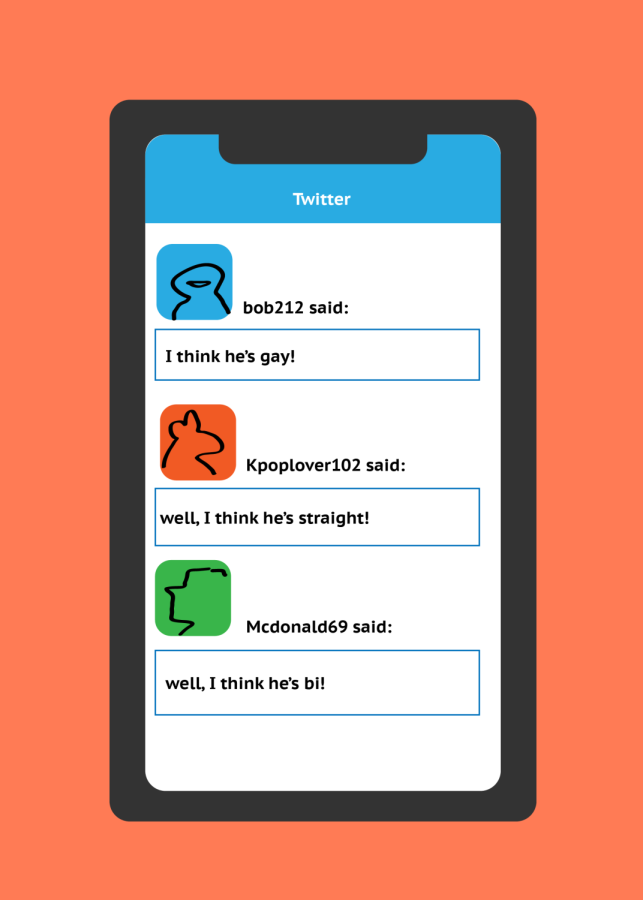Celebrity sexuality speculation prompts boundary issues
Feb 7, 2023
We seem to get a pretty good glimpse into the lives of major celebrities through interviews, behind-the-scenes videos and social media, but it’s safe to say that there’s still a lot we don’t know about them.
While most believe that being in the public eye is part of the celebrity status, others believe the role of celebrities does not subject them to reveal every single detail regarding their personal life.
Most would say that relationships are personal, but people still relentlessly bother celebrities, trying to get the hot gossip about their lives. One instance that’s been happening quite a bit lately, which seems to cross a line, is questioning celebrities about their sexuality.
Máiréad Meehan, freshman in LAS, said that a person’s sexuality should never be up for debate or discussion, no matter who it is.
“I believe one’s sexuality is something that should not be open for discussion because it is no one’s business except for the individual themselves,” Meehan said. “The same goes for celebrities. People think that because they are in the public eye, they agreed to expose their lives — which is not true.”
Get The Daily Illini in your inbox!
AJ Rijo Sánchez, graduate student studying sociology, said that although he agrees, representation does play a part in these instances.
“I will say I do not think celebrities’ sexualities should be public information. However, I acknowledge the utility and need for diverse representation,” Sánchez said.
However, sometimes representation is taken advantage of by fans and becomes something else entirely.
A similar incident recently occurred with 18-year-old actor, Kit Connor. Connor is well known for playing Nick Nelson in Netflix’s Original “Heartstopper,” which features an openly-gay character that finds friendship and love with another classmate.
The show’s message centers on being who you want to be and believing that there’s happiness out there for everyone.
However, people all over social media were soon accusing the “Heartstopper” actor of queerbaiting, which can be defined as a case where creators hint at, but then do not depict, LGBTQ+ representation in order to attract an LGBTQ+ audience. Many artists, actors and actresses have been accused of queerbaiting.
Because of these accusations, Connor felt the need to post on Twitter about it.
“Back for a minute. I’m bi. Congrats for forcing an 18 year old to out himself. I think some of you missed the point of the show. Bye,” Connor wrote.
Meehan also addressed the situation, saying that this idea divides people rather than bringing them together.
“People think that just because he played a role in an LGBTQ+ show means that he has to be a part of the community or else he shouldn’t be representing his character, Nick Nelson,” Meehan said. “This is a completely unrealistic idea and would not only out many celebrities, but also bring a divide in the industry.”
Another incident is in regards to the release of Taylor Swift’s song “Lavender Haze.” After the music video dropped, many fans started to speculate that it was about Swift’s own sexuality, since lavender is strongly associated with LGBTQ+ pride and community.
Swift released an in-depth background on the same song while she was promoting the album and confirmed it was not in relation to her sexuality. Many fans were upset and claimed she was queerbaiting and even homophobic.
“I think it was an unfortunate coincidence,” Meehan said. “People can still connect to the song anyway … because it’s put out into the world to connect and make people feel emotions and make it their own.”
The general public jumping to conclusions or assuming things with little to no knowledge about celebrities’ lives is problematic. It can even cause harm, like with Connor.
Jordan Smith, freshman in Education, explained where he thinks the problem begins.
“I do feel like people are a little bit obsessed about knowing what people are just so that they can associate a label,” Smith said.
It’s hard to not want to know everything about the people we adore, but there’s a line in-between what’s OK to ask and what’s not. It seems that most would agree that sexuality is one of those due to the toxicity it can bring into the situation. Yet, people still constantly ask about it when given the opportunity.
“People should read more on LGBTQ+ history and listen to others to hear different experiences in life,” Meehan said. “(There) is so much hatred in the world that people just need to respect each other and their boundaries.”






